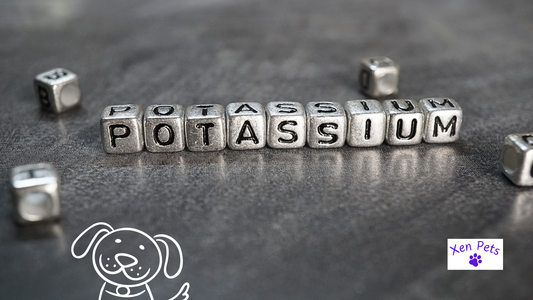8 Critical Signs of Stress in a Dog
Tory JohnsonShare
Stress can be a contributing factor in the death of an otherwise healthy dog. Dogs owners must understand the critical signs of stress in a dog.
In this post, we'll discuss 8 critical signs of stress in dogs.
Depression in dogs - Symptoms and What to Do
If you feel like your dog is overly stressed, take a step back and evaluate how you can help keep your dog calm. Your dog's life depends on it.
Let's take a deeper look at your dog's stress and anxiety issues.
Can dogs die from stress?
Changes in routine and underlying health issues can stress many dogs.
Stress and anxiety can lead to a number of serious health problems, including an increased heart rate, difficulty breathing, and gastrointestinal issues.
In severe cases, stress can contribute to your dog's death. Give your dog a Calming Chew today to relieve stress and anxiety.
Our chews are crafted with natural ingredients like Chamomile and Valerian Root to relax your dog.
Calming Chews relieve your dog's anxiety, regulate sleep, and provide a health boost.
Shop today: Calming Chews - Free Shipping

Additionally, if your dog is experiencing stress or anxiety, there are a number of things you can do to help them cope, such as providing them with a quiet place to rest and ensuring they have plenty of time for exercise and mental stimulation.
Critical signs of stress in a dog
For dog owners, it's important to be aware of the different types of stress that your dog may experience.
Animals are very sensitive to changes in their environment, and this can often lead to anxiety in dogs.
Dogs may become stressed when they are left alone, when they move to a new home or when there is a change in their routine.
8 Critical signs of Stress in your dog
- Barking or whining
- Yawning and/or drooling
- Changes in posture
- Hiding
- Changes in bodily functions (Do dogs poop when they're scared?)
- Panting or hyperventilating
- Shedding
- Changes in eyes and ears (Are your dog's ears pinned back?)

Additional causes and signs of stress in dogs
They may also become anxious during loud noises, such as thunderstorms or fireworks. If your dog is showing signs of stress, such as panting, pacing or shaking, it's important to take steps to help them feel more comfortable.
This may include providing a safe space for them to retreat to, using calming pheromones or calming chews for dogs, and training them to associate positive experiences with the things that make them anxious.
By understanding the different types of stress that dogs can experience, you can help to make their lives happier and more relaxed.
Can dogs die from separation anxiety?
It's estimated that more than 20% of dogs suffer from separation anxiety.
Similar to other stressors, separation anxiety can be a contributing factor in the death of a dog.
The most common signs of separation anxiety include pacing, barking, and destruction. Dogs with separation anxiety may also try to escape from their homes or yards.
While it can be difficult to deal with a dog with separation anxiety, there are some things you can do to help ease their stress.
First, try to create a calm environment for your dog before you leave. This may involve putting on some relaxing music or giving them a special toy to chew on. You should also avoid making a big deal out of leaving or coming home.
Finally, make sure you give your dog plenty of exercise and attention when you are home so they feel loved and valued.
With a little patience and effort, you can help your dog overcome their separation anxiety.

Chronic Stress in Dogs
Dogs are known for being loyal, loving companions. They provide us with stress relief, unconditional love, and security. However, dogs can also suffer from chronic stress.
Just like humans, dogs can experience stressors like separation anxiety, loud noises, and changes in routine.
When stressors are constant or go unresolved, it can become chronic.
This type of stress can manifest in physical symptoms like:
- Decreased appetite
- Diarrhea
- Excessive panting
It can also cause behavioral changes like increased aggression or withdrawal.
If your dog is exhibiting any of these signs, it's important to consult with your veterinarian. They can help you create a plan to relieve your dog's stress and improve their quality of life.
Can a dog die from anxiety?
While it might seem like your dog is just being dramatic when they pace back and forth or refuse to eat, anxiety can actually be a very serious issue for animals. Both stress and anxiety can contribute to health problems and lead to an early death.
Just like humans, dogs can experience physical and emotional stress that can lead to health problems.
The most common cause of death from anxiety is heart failure. When a dog's anxiety becomes severe, their heart rate speeds up and their blood pressure rises. This puts a lot of strain on the heart, and over time, it can lead to heart failure.
In addition to physical stress, anxiety can also cause dogs to lose interest in food and water, which can lead to dehydration and starvation.
If you think your dog is suffering from anxiety, it's important to talk to your vet so you can develop a treatment plan. With the right care, your dog can live a happy and healthy life.
What happens when a dog is too stressed?
Over time, stress can lead to health problems such as gastrointestinal issues, reproductive problems, immunodeficiency, and even cardiovascular disease.
Can a dog die from depression?
Just like people, dogs can suffer from depression. While it may be difficult to recognize the signs in our furry friends, depression in dogs is a real health issue that can have serious consequences.
Symptoms of depression in dogs can include diminished energy levels, decreased appetite, increased sleeping, and isolation from family members.
If left untreated, depression can lead to health issues such as heart disease, weight gain or loss, and stomach problems.
In severe cases, depression can even be fatal.
If you suspect that your dog is depressed, it's important to talk to your veterinarian.
Wrap Up: Can A Dog Die From Stress?
Don't wait until your dog is showing signs of stress to take them to the vet.
If you think they may be under a lot of stress, make an appointment with your vet immediately.
While some sources say that dogs can die from stress, it's important to get them help before it gets to that point.
Your vet will be able to help you figure out what is causing your dog's stress and how to best address it. They may also have helpful tips for preventing future episodes of stress. Lastly, check out our article, "10 Warning signs your dog is crying for help."











